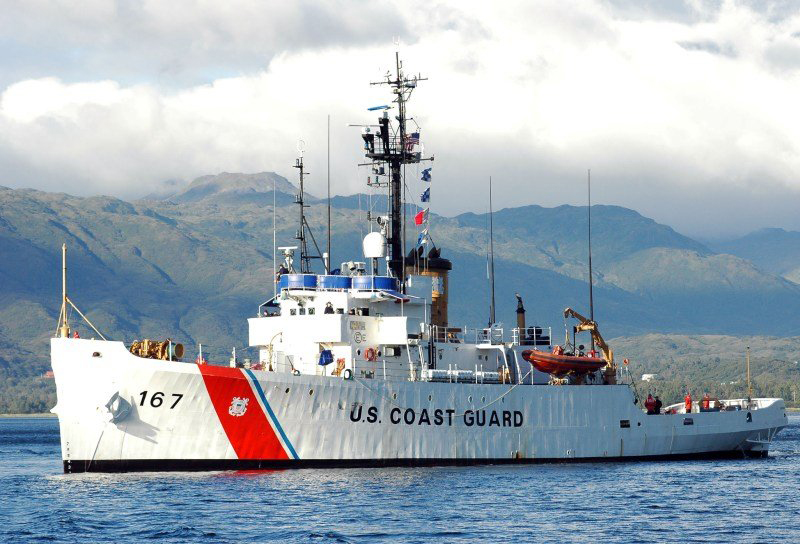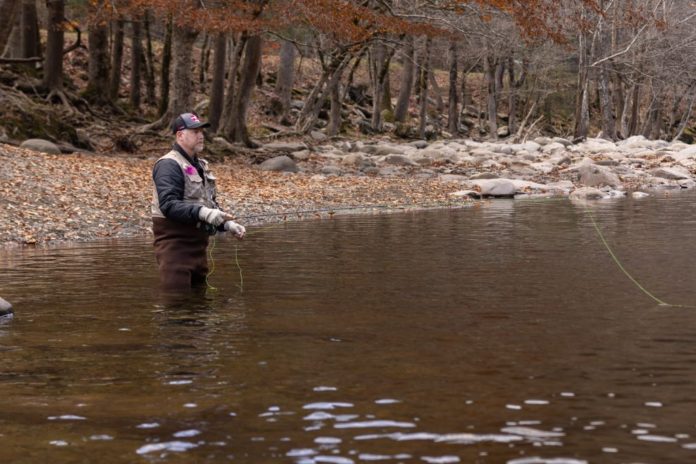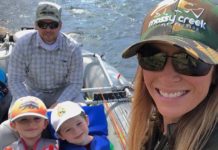Knoxville’s Dale McCurry reached the pinnacle of US Coast Guard service while saving lives and training others
Standing waist deep in the gently flowing waters of the Little River in Townsend, Dale McCurry is intent on making a perfect presentation. Fly fishing is exactly that, the art of presentation, making something artificial appear completely natural. As he casts upstream, he is careful to maintain a tight loop in the line. The fly glides ever so gently into the water, the current and the trout below barely noticing. He mends the line to continue the drift, waiting for that slight indication that a fish has taken the fly. The background of the Great Smoky Mountains National Park, coupled with the quiet flow of the water around him creates a serenity which McCurry is no stranger to.
Fly fishing is a carefully orchestrated set of steps to convince a fish to take the fly. One tiny knot in your leader or indelicate presentation of your fly can mean the difference between a great catch or the heartbreak as you watch your fish swim away. There’s finesse involved in this, a trait that McCurry, a Coast Guard veteran, knows all too well.
McCurry caught the fly fishing bug while stationed in southeast Alaska with the guard. A fellow “coastie” took him under his wing and showed him the ropes of how to fly fish. “It was refreshing,” he says. “No noise, just out in nature.I think it’s the serenity I love so much.”
Serenity was vital to McCurry’s time in the service. He spent much of his career as a member of a Search and Rescue (S&R) unit, a role largely dependent on that very same finesse that he shows out in the water, except in that role, the stakes were much higher. “One decimal point can mean the difference between being in the right spot and not being in the right spot,” he says, factors that can mean life or death for someone on the open sea.
McCurry charted a 24-year rise from new recruit in 1997 to Master Chief Petty Officer—the highest enlisted rank achievable in the US Coast Guard. On that journey he encountered joys he’s happy to remember and sorrows he wishes he could forget, from the sublime heights of marveling at remote Alaskan beauty as a new fly fisherman to the devastating depths of pulling a child’s lifeless body out of the frigid Chesapeake Bay.
And while this Savannah, Georgia, native (reared mostly in Hilton Head, South Carolina) felt destined to either follow his family’s well-worn path into a service business or to set a course toward a less certain but likely more adventurous future, he chose to navigate the channel less traveled, and that has made all the difference.
Conditioned for the Sea
While McCurry was an only child whose birth father was absent from his life, he did not lack for a strong male presence. His mother’s brothers saw to that.
“The whole family took me in,” McCurry recalls in a conversation from his home in east Knoxville, where he and his wife Spring and their daughters Taylor, 21, and Lauren, 18, moved to Connecticut in mid-2021.
McCurry may be a recent transplant to Knoxville, but he’s no stranger to East Tennessee’s alluring blend of natural beauty, hospitality, and opportunity. He often visited the area as a child and later as an adult on group motorcycle rides and family vacations. He has long been smitten. “I love the mountains, the culture, the people. Everybody’s nice. There’s a big-city vibe without the big-city crowds and traffic.”
In those early Hilton Head years, McCurry was smitten mostly with the water and the blessing of his family. “My cousins and I grew up like brothers and sisters,” he recalls. “We went to Grandma’s house every Sunday and played football or baseball. Aside from the legacy of not having a father, it was a storybook upbringing. My uncles took me to games, hunting, fishing, farming. They offered the time to teach me and to be sure I understood what they taught me. It’s truly remarkable.”
McCurry’s maternal grandfather (US Navy) and uncles Tommy (Navy) and Michael (Air Force) served in the military. Those connections partially informed his career considerations. More tangibly, the family operated an air-conditioning service company primarily for Hilton Head’s many resorts. “I knew my future would be as an AC guy—and attics in the South are hot—or I could try other things. I started as a mechanic.”
You’re a Coastie Now
After meandering through several trades, McCurry was still searching for “my one thing” when he visited a military recruiting center. The only person on duty was a woman representing the Coast Guard. As she explained the branch, McCurry thought it sounded like a natural fit.
Entering into this fray in 1997, McCurry reported for eight weeks of basic training at Cape May, New Jersey. “It was the full indoctrination to a seagoing service and the military,” he says. Company commanders “wearing those funny hats would yell at ya, nonstop.” At a height just north of 6’4”, McCurry endured the wrath of one particular commander who stood 5’5”. “He made me get on my knees so he could yell at me face to face.”
The guard turned out to be a fit for McCurry, but “it took my first year to realize my love for the ocean was there.” Although he grew up on the coast, “it’s not until you get a couple hundred miles offshore that you realize it’s either in you, or it’s not. I found that I truly enjoyed it.”
After basic, McCurry was assigned to a Coast Guard cutter out of Charleston. He was deployed mostly along the lower east coast and the Caribbean. From there, he attended advance training (A-school) in Yorktown, Virginia, became an EMT, and was sent to an S&R unit in Virginia Beach, where he would encounter some of the most trying days and nights of his service.
‘I Would Have Wrapped Him in Blankets’
The Chesapeake “is a harrowing place,” says McCurry. “It’s a big washing machine. When the weather kicks in, boating can become treacherous.” Manning a 47’ Motor Life Boat, his unit was called upon in numerous emergency situations. There were water rescues, arrests, boat tows, and body recoveries after suicides from the Chesapeake Bay Bridge. The toughest case was a group of four on an 18-20’ foot bowrider.
“There was a small child, under 8, who had the wrong size life jacket. When the boat capsized, he slipped through it. We found him two days later. It was devastating,” McCurry recalls, adding later. “When you pull a grown man out, that’s one thing. When you pull out a small child, that’s completely different. The sight and the smell.” Had the boy been wearing the proper life jacket, “we would have pulled him out of the water a few minutes after the accident,” McCurry says quietly. “I would have wrapped him up in blankets. Life would have been different.”
Advancements…and Setbacks
The memory of that and other life-and-death duties often haunted McCurry. It was hard for Coasties to talk about tragic circumstances. “Sometimes we did, sometimes we didn’t,” he says. “That station had a great officer in charge. We were supported. If we wanted to talk, we could. We were all pretty young. We suppressed everything.”
As McCurry’s time in the guard progressed, so did his personal life. “I met my wife, got married, had a child. With my four years coming up, we had another child. For my pay grade and my qualification codes, the Coast Guard let me get out. During all that, September 11 happened.”
After 9-11, “the detailer called me and said you can come back and we’ll give you a bonus, or we will bring you back as an activated reserve.” He opted to return. In hindsight, “it was a durn godsend, going back in. It gave me the structure, the purpose, the opportunities to advance and improve.”
While continuing to serve, personal tragedy struck. His beloved mother passed away in December 2004. “That was a defining moment,” McCurry says. “My security blanket was gone, and I had to grow up. I started taking life more seriously and became more career-minded.”

Photo courtesy Marine Exchange Alaska.
Here Today, Gone for Months
Throughout his guard service, McCurry’s deployments ranged from short stints essentially “on call” (two days on, two off, odd weekends) to longer assignments on bigger ships—two to four months or more. Either way, time on duty amounted to about six months each year.
Guard life was not easy on Spring and the two girls. “This life isn’t for everyone,” McCurry concedes. “Spring was a single parent more than half the year. And my poor kids, they lived in nine states. Then again…they’ve seen a lot of the country. We bounced from Georgia to Alaska to St Louis to Cleveland to Connecticut.”
In Cleveland, McCurry was part of a Great Lakes Region unit that managed the repair and maintenance of small boats. “Rolls Royce jet drives with all kinds of advanced technical stuff” weren’t easy to fix, what he calls “depot-level maintenance.” In Alaska, he was on a Coast Guard cutter in the Bering Sea from 2007 to 2010 while Spring and the girls lived in the southeastern part of the state. “I was gone a lot,” McCurry says.
Later in his career, he became a leader and trainer of other Coasties. “It was a good fit for me. I was a maritime law-enforcement trainer. My last assignment was for five years, which is uncommon, at the Coast Guard Academy” in New London, Connecticut. Among other projects, he oversaw the lab at the academy’s Department of Engineering. “A bunch of engineers with a common problem became a brain trust on how to fix it.”
Fewer than one percent of Coasties rise to the highest rank of Master Chief. McCurry says he took the long path of “steady progress” to advance to what he considered not a pinnacle of pride but rather a greater opportunity to serve. And as he downplays that and other aspects of his service, Spring chimes in to fill in a few gaps—like the food pantry McCurry helped spearhead in Connecticut to help hundreds of Coasties receive much-needed provisions during a US government shutdown. “He’s humble, one of the humblest people I’ve ever met,” Spring says of her husband. “He doesn’t take credit when it’s due, even though I know he deserves it.”
McCurry smiles and jumps back in: “We. It’s always ‘we did it.’ Not just me.” Spring smiles back as if to say: See what I mean?
Knoxville Calling
On June 14, 2021, after 24 years, McCurry retired from the Coast Guard. He didn’t take much time to reflect; he began his new job in Knoxville in July.
Why Knoxville? “After retiring from the military, you get to go to your home selection, and they’ll move you,” he says. “Officially, I had a great job opportunity in Knoxville [with Phillips Corp.]. Unofficially, we wanted to move here because we knew it was a great community.”
McCurry and Spring had “competing ideas” about which part of Knoxville to call home. “I wanted to be back in the hills or deep in a holler so far you’d have to pump in the sunlight. She wanted to be closer to civilization. I got outvoted.”
For her part, Spring has “mixed emotions” about the new retirement phase of life. “I’ve been a military wife for a very long time, and it’s like a family. We are adjusting to civilian life. I do like Knoxville. Everyone is friendly and welcoming.”
Working for Phillips, McCurry is a project manager setting up Training Facilities for HAAS Service Training. And while there are still elements he misses about his life in the guard, it seems he finds himself in a good space, fit for the next chapter of his life. “When you do this for so long, it gets in your blood. I miss the people I worked with. That said, I landed with a very military-friendly company. That’s a key that not a lot of veterans seek in transition. Money is important, but it’s better to pick a place based on culture. At Phillips, every interaction has been pleasant and professional.”
It’s not hard to see why a pastime like fly fishing might have stuck with him after all these years. The stories of the search and rescues are enough to eat at anyone. But thinking back on his 24 years in the Coast Guard, McCurry finds nothing but positive, remembering the lives he helped to save and the places he visited—but most of all the friends he was blessed to make.
“It seems like a lifetime,” he says of his service. “I met so many people and I had so many mentors. Every Coastie out there was always willing to help, and it helped me become a better person. I’m forever grateful.”
Credit: Source link































